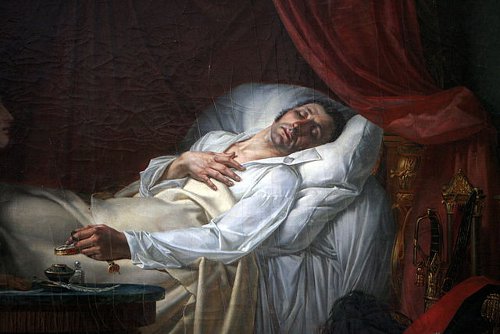
In 1975, artist Richard Haas renewed the building at 112 Prince Street in Manhattan by covering its blank brick side with a five-story mural emulating the cast-iron architecture of its facade. Only two of the windows are real.

In 1975, artist Richard Haas renewed the building at 112 Prince Street in Manhattan by covering its blank brick side with a five-story mural emulating the cast-iron architecture of its facade. Only two of the windows are real.
By reducing each chapter of the Bible to a single line and presenting these lines in rhyming quatrains, the Juvenile Bible of 1804 condenses the Old and New Testaments into 69 memorizable pages. By learning a simple system, one can then cite any chapter of the Bible from memory. Here are the first three stanzas of Genesis:
1 All things created, Moses writes,
2 And Paradise displays;
3 Tells Adam’s fall, which ruin’d all:
4 Cain righteous Abel slays.
5 Before the flood man’s life was long:
6 Noah the ark doth frame:
7 The world is drown’d, eight favour found,
8 Out of the ark they came.
9 Cov’nant of rain-bow; Noah drunk,
10 His offspring is increast;
11 They Babel rear, confounded are.
12 Abram is call’d and blest.
To aid in memorization, the stanzas begin with successive letters of the alphabet, so a stanza that starts with A always marks the first chapter of a book, B the 5th, C the 9th, and so on. Once we’ve memorized the stanzas above, we can always name the chapter in Genesis in which the Tower of Babel is described: It’s the third line of the stanza beginning with C, so it’s chapter 11. Conversely, if we’re asked to name the subject of any given chapter, we can produce the answer using the same system.
“This novel and curious arrangement will, it is presumed, gratify the taste of young readers, and not only give them a relish for the Sacred Volume, but even assist their memories when duly acquainted with it,” writes the anonymous author. To his credit, he adds, “No portion of it should ever be allotted as a Task; the Author of this Work being well convinced, it is owing to the modern and impious mode of Education, compelling Children to learn Collects, chapters in the Bible, Hymns, &c. as occasional Exercises, and frequently by way of Punishment that the Word of God is not heard and read with that satisfaction it always should be.”

Between 5:30 and 6:15 p.m. on sunny days from mid-October to early November, a bear appears in the Blue Ridge Mountains near Cashiers, N.C.
It’s caused by 4,930-foot Whiteside Mountain, whose shadow is cast at the right angle by the setting autumn sun.
The bear appears also in late winter, from mid-February through early March.
(Thanks, Sharon.)
fleer
v. to smile contemptuously
maledicent
adj. given to evil-speaking; slanderous
malison
n. a curse

San Francisco reporter James Hopper got to bed at 3 a.m. on April 18, 1906, after a night at the opera. After two hours of sleep he felt himself suddenly shaken “like a fish in a frying-pan”:
I got up and walked to the window. I started to open it, but the pane obligingly fell outward and I poked my head out, the floor like a geyser beneath my feet. Then I heard the roar of bricks coming down in cataracts and the groaning of twisted girders all over the city, and at the same time I saw the moon, a calm, pale crescent in the green sky of dawn. Below it the skeleton frame of an unfinished sky-scraper was swaying from side to side with a swing as exaggerated and absurd as that of a palm in a stage tempest.
Just then the quake, with a sound as of a snarl, rose to its climax of rage, and the back wall of my building for three stories above me fell. I saw the mass pass across my vision swift as a shadow. It struck some little wooden houses in the alley below. I saw them crash in like emptied eggs and the bricks pass through the roof as through tissue paper.
The vibrations ceased and I began to dress. Then I noted the great silence. Throughout the long quaking, in this great house full of people I had not heard a cry, not a sound, not a sob, not a whisper. And now, when the roar of crumbling buildings was over and only a brick was falling here and there like the trickle of a spent rain, this silence continued, and it was an awful thing. But now in the alley someone began to groan. It was a woman’s groan, soft and low.
Jacob Levinson, a director of Fireman’s Fund, weathered the quake with his family at 2420 Pacific Avenue. He wrote later, “I am frequently asked whether I was badly frightened by the shaking, to which I invariably reply that I had passed the point of being frightened, exactly as one might on a sinking vessel in mid-ocean when fully alive to the inevitable. My only thought was to get the family together so that when the house went down we should all go together.”

On my deathbed I exact a promise from you. Then I die, and you ignore the promise. Most of us would feel that this is wrong, but why? If I no longer exist, then who is wronged by your omission?
Similarly, it seems wrong to disparage the dead, or to mistreat a corpse. But why? Can we have a moral obligation to a person who doesn’t exist? Do the dead have rights?
“The dead, if they exist at all, are so much dust,” writes philosopher George Pitcher. “How is it possible for so much dust to be wronged?”

Henry Hunt’s “graffiti prevention apparatus,” patented in 1997, offers a novel way to keep city walls clean: Paint manufacturers would mix magnetic material into their products, and a sensor near each building would sense when a vandal was near.
“When a proximity sensor on, or in the vicinity of, the structure is triggered by an approaching intruder, a magnetic field created along the targeting surface acts to repel the spray of marking media directed at it.”
Alternatively, the sensor would direct a signal to the spray-paint can, turning the nozzle away from the wall or shutting off the flow of paint. But I guess the spray-paint manufacturers would all have to participate … and vandals may be their biggest market.
In 1917 Ben Hecht and Maxwell Bodenheim agreed to debate one another before a Chicago literary society. They chose the topic “Resolved: That People Who Attend Literary Debates Are Imbeciles.”
Hecht took the podium, surveyed the crowd, and said, “The affirmative rests.”
Bodenheim rose and said, “You win.”
If the English names of the natural numbers are spelled out consecutively, what letter occurs most frequently? In 1981 Frank Rubin showed that I never overtakes E in this race. When we reach NINE HUNDRED NINETY-NINE, the letter E has appeared 3,130 times, while I has appeared only 1,310. After NINE HUNDRED NINETY-NINE THOUSAND NINE HUNDRED NINETY-NINE, each of the names ONE through NINE HUNDRED NINETY-NINE has appeared 1,000 times to the left of the word THOUSAND and 999 times to the right, so at the ONE MILLION mark I has appeared 2,620,000 times and E 6,260,000.
When we reach ONE BILLION, I has had a bit of a boost by appearing 1,998,000,000 times in the word MILLION, but it’s not enough: At this point E has appeared 9,390,000,000 times and I only 5,928,000,000.
The gap is never closed. It narrows if an -illion word has two or more Is and no Es, but if E also appears (SEXTILLION, SEPTILLION) then it widens. I makes its closest approach at ONE SEXTILLION, when we’ve racked up 2.0159 × 1022 Is and 2.191 × 1022 Es.
In fact, the only letters that ever surpass E, anywhere in the sequence, are O at the end of TWO and T before THREE is spelled out.
(“Colloquy,” Word Ways, November 1981)